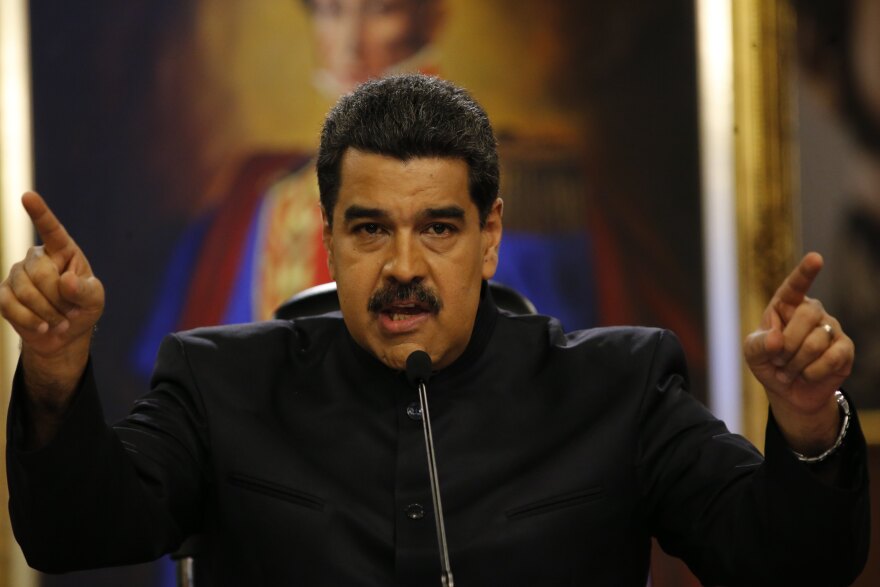COMMENTARY
Since the late Hugo Chávez’s socialist revolution came to power in 1999, its opponents have made more missteps than hacks like me can count.
And their diplomatic debacle in the Caribbean this month was another. (More on that later.)
But the Venezuelan opposition can also score redemptive moments that make you think the Chavistas’ catastrophic rule over the western hemisphere’s most oil-rich nation might actually end someday. The opposition’s smart response to a bizarre helicopter escapade over Caracas this week is one of them.
To recap: Oscar Pérez, a Venezuelan investigative police officer, commandeered a police helicopter late Tuesday afternoon and buzzed the Caracas presidential palace with a banner calling for insurrection against Chávez’s socialist successor, authoritarian President Nicolás Maduro. Most Venezuelans blame Maduro for their country’s economic collapse, and he’s been the target of massive anti-government protests this year.
Pérez also flew over the Supreme Court building and allegeldy hurled live grenades. (No one was hurt.) In a video, Pérez – flanked by four armed men wearing ski masks – urged his paisanos to join him and his security forces' “coalition” in their fight against Maduro’s “tyrannical” regime.
READ MORE: Venezuela Copter Cop Who Buzzed Maduro Has Taken Daring Action Before - Onscreen
Problem is, it’s doubtful Pérez has much if any insurrectionist “coalition” behind him. His copter crusade looks more like an action movie fantasy – an echo, in fact, of his role in an actual 2015 film titled “Muerte Suspendida,” or “Suspended Death,” in which he plays a special forces hero who, well, pilots a police chopper.
In real life, it appears Pérez went into hiding after his Tuesday mission – and Venezuela’s opposition leaders deserve kudos for not hunting him down for selfies. The last thing they need is to be associated with anything that smacks of a coup attempt. They’ve already been there and done that – 15 years ago.
Many Venezuelans wonder if Maduro staged this week's helicopter attack to give him a pretext for more severe crackdowns. If that's his perverse game – one he's entirely capable of – it gives the opposition even less room for error.
In 2002, Chávez’s whack economic policies were about to drive Venezuela’s critical oil industry into the ground. He probably would have lost a constitutional recall referendum if opposition leaders had pushed for one. Instead, they and dissident military chiefs decided to mount a coup d’état.
It worked – for about two days, until angry Chávez supporters came storming out of the barrios and restored him to power. Oil prices then began skyrocketing. Chávez suddenly looked invincible; his foes looked like incompetent coup-mongers.
Venezuela’s opposition leaders have since learned to avoid such blunders at home. But that makes it all the more baffling that they’re still fouling up abroad. The most recent case in point is their handling of Caribbean governments – which just cost them potentially valuable international censure of Maduro at the Organization of American States.
Many poor, energy-starved Caribbean nations feel indebted to Chávez’s revolution for all the cut-rate oil it’s sold them. So when a vote came up this month at the OAS general assembly in Cancún on a resolution to denounce Maduro’s trashing of Venezuela’s democracy – including his plans to rewrite the Constitution next month to gift himself more powers – enough of them went thumbs-down to defeat it.
PROTOCOL PROBLEMS
Venezuela’s opposition leaders might have avoided that setback if they’d lobbied the foreign ministers of the Caribbean Community, or Caricom, at their meeting in Barbados before the OAS assembly – just as Maduro’s foreign minister did. But no opposition representative showed up. (Granted, Maduro has barred some of them from leaving Venezuela.) The opposition instead sent letters to the individual Caricom foreign ministers.

Except the ministers didn’t see the letters in time because they were supposed to be sent directly to Caricom – a bit of protocol the Venezuelan opposition didn’t bother to check up on, according to high-ranking Caribbean diplomats I spoke with.
Since then, facing no meaningful international blowback, Maduro has felt emboldened to push ahead with his more repressive agenda. Violence against the demonstrations is up – two more teenage protesters were shot and killed by soldiers this week. And he’s poised for a kangaroo-court prosecution of his attorney general, Luisa Ortega, who’s had the guts to criticize his tin-pot behavior.
Many Venezuelans wonder, in fact, if Maduro staged this week's helicopter drama to give him a pretext for more severe crackdowns. If that’s Maduro’s perverse game – one he's entirely capable of – it gives the opposition even less room for error.





